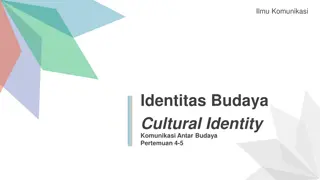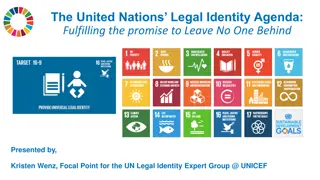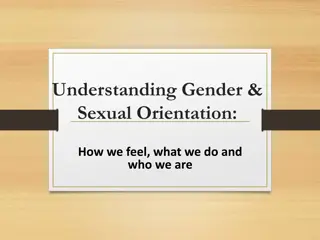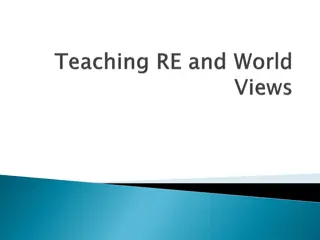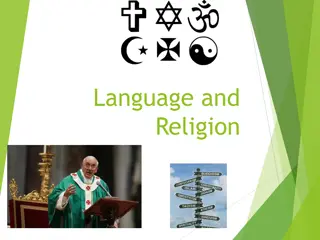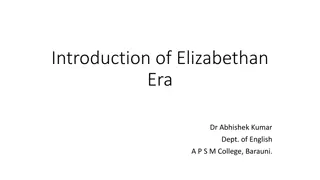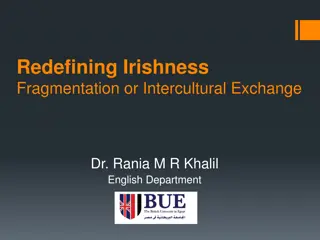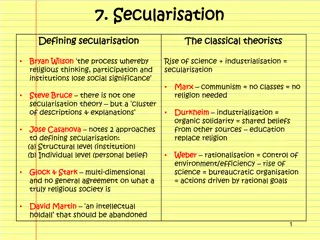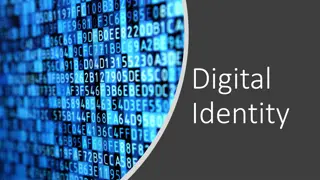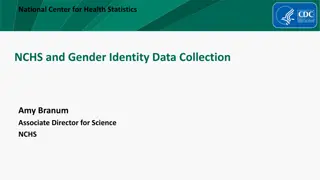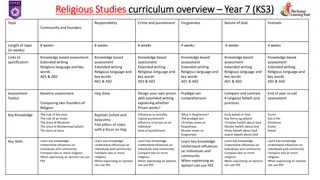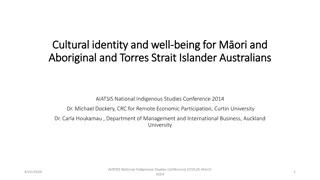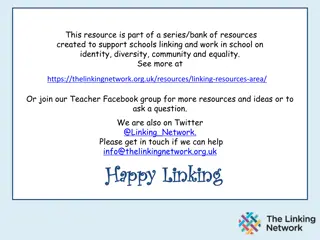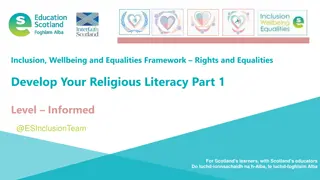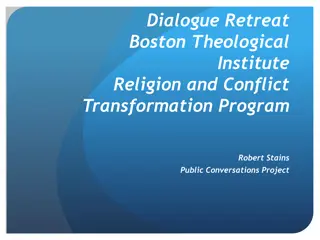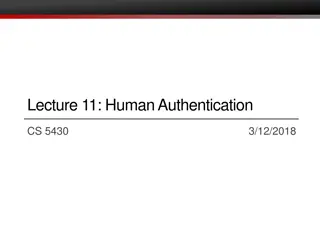Status of Family Laws in India: Hindu vs. Religious Minorities
The family and personal status laws in India vary between Hindu law and those pertaining to religious minorities. While Hindu law has seen extensive reforms, discriminatory provisions still exist. In contrast, laws governing religious minorities have undergone fewer reforms, leading to greater inequ
2 views • 4 slides
Global Mobility and Legal Identity Strategy Presentation
Explore the significance of legal identity and global mobility in the context of migration and border management as presented by Mme. Mariama Mohamed Cisse, Director at IOM Special Liaison Office to the AU and ECA. The presentation addresses frameworks, principles, and strategies for ensuring legal
3 views • 14 slides
Rwanda HIE Patient Identity Management System Overview
The Rwanda Health Information Exchange (HIE) system focuses on patient identity management to uniquely identify individuals seeking healthcare across the country. By maintaining a set of identifiers in the client registry and avoiding duplication of patient records, the system ensures efficient and
12 views • 8 slides
Global Identity Verification Market Size & Analysis _ BIS Research
The Global Identity Verification Market has witnessed exponential growth in recent years, driven by factors such as increasing instances of identity theft, regulatory compliance requirements, and the growing adoption of digital platforms. According to BIS market research the global identity verifica
10 views • 4 slides
United Nations Legal Identity Agenda and Civil Registration Guidelines
The United Nations Legal Identity Agenda aims to ensure legal recognition for all individuals through civil registration systems. This initiative, aligned with the 2030 Agenda for Sustainable Development, emphasizes birth registration and legal identity as fundamental rights. The agenda encompasses
1 views • 10 slides
Understanding Cultural Identity in Communication Studies
The importance of identity in communication is discussed in relation to cultural, racial, ethnic, gender, national, regional, organizational, personal, and cyber/fantasy identities. Identity development influences social roles and communication interactions. Various social identities shape our self-
1 views • 28 slides
Understanding Religious Conflict: Definition and Types Explored
Religious conflict is a complex and recurring concept throughout history. Scholars have defined it as disagreements between religious groups. This conflict arises from contentious issues touching on ideology, morality, power, and identity, influenced by various socio-political, economic, and cultura
1 views • 13 slides
Evolution of Akbar's Religious Policy: A Historical Overview
In the 16th century, Akbar the Great implemented a revolutionary religious policy in the Mughal Empire. Initially a devout Sunni Muslim, Akbar evolved his stance to promote harmony and equality among all religions, fostering tolerance and understanding. This shift marked a significant departure from
1 views • 25 slides
Elizabethan Religious Settlement: Unity Amidst Division
Amid religious division in England, Queen Elizabeth I implemented a Religious Settlement in 1559 to unify the country. The settlement, a blend of Protestant and Catholic elements, aimed to maintain peace and prevent rebellions. Elizabeth's strategic compromise pleased most people, though lingering t
0 views • 14 slides
Understanding Secularism: Principles and Advantages
Secularism is the principle of separating government institutions from religious entities to ensure equal rights for believers and non-believers. It safeguards freedom of religious belief and practice, upholds religious freedom, and promotes democracy and fairness. Secularism aims to prevent religio
0 views • 21 slides
United Nations Legal Identity Agenda: Achieving SDG 16.9
The United Nations Legal Identity Expert Group (LIEG) aims to close the global legal identity gap by over 300 million within four years. The group focuses on implementing a life-cycle approach to legal identity, starting from birth, to ensure no one is left behind. The structure and strategy of LIEG
0 views • 10 slides
Understanding Religious Language: Cognitivism vs. Non-Cognitivism in the University Debate
This discussion explores the debate between cognitivism and non-cognitivism in religious language. Cognitivism asserts that religious claims aim to describe the world and can be true or false, while non-cognitivism argues that such claims express attitudes and cannot be verified. Flew's challenge qu
0 views • 9 slides
Exploring the Significance of Roots and Identity in Human Life
The lesson revolves around the concept of roots and identity in human life, emphasizing the deep connection individuals have with their origins. It discusses the longing to return home during significant occasions like Eid, highlighting how roots shape a person's sense of belonging and identity. Thr
0 views • 15 slides
Understanding Gender and Sexual Orientation: Exploring Identity and Attraction
Delve into the complexities of sexual orientation, gender identity, and attraction. Discover the nuances of orientation, behavior, and identity. Learn about various terms such as heterosexual, lesbian, gay, bisexual, queer, and more. Understand the significance of gender identity, including cisgende
1 views • 16 slides
The Importance of Digital Identity in Modern Society
Digital identity plays a crucial role in modern society by enabling secure online services and verification processes. Identity management forms the foundation for moving services online, providing a means to verify individuals in a completely digital environment. The Pan-Canadian Trust Framework fo
1 views • 16 slides
Guide to Using the BSA Calendar of Religious Observances
The BSA Calendar of Religious Observances is a valuable resource for scheduling scouting events in consideration of various religious holidays and observances. This guide provides an overview of the calendar, highlights important dates, and emphasizes the importance of respecting religious diversity
0 views • 8 slides
Exploring the Significance of Religious Education in Cultivating Understanding and Empathy
This content delves into how religious education prompts challenging questions about life's meaning, fosters personal reflection, and encourages empathy and respect for diverse beliefs. It aims to help children explore different religions, develop a sense of identity, and understand the impact of re
0 views • 46 slides
Understanding the Role of Language in Religion
Exploring the significance of language in religious contexts, this content discusses the functions, features, lexicon, grammar, and metaphorical aspects present in religious language. It delves into how religious language upholds spiritual beliefs, persuades believers, and expresses specific attitud
0 views • 8 slides
Understanding the Cultural Dimensions of Food and Religious Influences in Culinary Arts
Explore the impact of religious beliefs on food traditions and dietary restrictions across different cultures in the culinary world. Learn about the influence of major world religions on eating habits, food choices, and culinary practices. Discover how various religious groups, such as Christians, o
0 views • 26 slides
Insight into the Elizabethan Era: Queen Elizabeth's Reign
The Elizabethan Era under Queen Elizabeth's reign marked a transformative period in England, characterized by a shift from darkness to light in various aspects of English life. Queen Elizabeth's dedication to England and her inspiring patriotism brought about unity and national greatness, amidst rel
0 views • 9 slides
Redefining Irish Identity in a Globalized World
Exploring the complexities of Irish identity in a post-colonial, globalized society through the lenses of cultural fragmentation, intercultural exchange, and the evolving narratives of contemporary Irish playwrights. The discourse delves into the challenges of maintaining a distinct Irish identity w
2 views • 15 slides
The Vital Role of Religious Institutions in Supporting Immigrants
Religions and immigration are interlinked in modern societies, where religions play a significant role in providing services, defending rights, and supporting the social cohesion of immigrants. Mainstream religious institutions serve as key actors in offering assistance, advocating for migrant right
2 views • 14 slides
Understanding Religious Language: Flew, Hare, Mitchell
Exploring the contrasting views of cognitivism and non-cognitivism in the context of religious language through the perspectives of Flew, Hare, and Mitchell. Delve into Flew's challenge on the undetectable gardener, Hare's concept of bliks, and Mitchell's response to the rationality of religious bel
0 views • 7 slides
Religious Accommodation in the Army: Advising Command
The content discusses the role of the Chaplain Corps in advising Soldiers and leaders on religious accommodation in the Army as of February 13, 2019. It covers learning objectives, legal foundations, Army policies, procedures, recent changes, and references related to religious accommodation. The in
0 views • 36 slides
Understanding Religious Discrimination Laws in California Workplace
Learn about the regulations and protections under FEHA and Title VII in California, including religious exemptions, accommodation requirements, case studies, and best practices to address discrimination issues effectively. Discover the statistical insights on religious discrimination complaints and
0 views • 45 slides
Understanding Secularisation: The Decline of Religious Influence in Society
Secularisation refers to the process in which religious thinking, participation, and institutions lose their social significance. This phenomenon is influenced by factors such as the rise of science, industrialisation, changing social attitudes, and the disengagement of the church from society. Evid
0 views • 8 slides
Philosophers' Views on Religious Experience: Insights and Critiques
This lesson delves into the perspectives of various philosophers such as Rudolph Otto, Richard Swinburne, John Hick, and Michael Persinger on religious experiences. It explores concepts like the numinous, religious knowledge, God's existence, and criticisms on the validity of religious experiences.
0 views • 7 slides
Philosophers' Views on Religious Experience: Insights from William James
Explore William James' perspective on religious experiences, including his views on existential and value judgments. Understand how James argued for the validity of religious experiences and their potential proof of God's existence. Delve into the implications of emotions and prior beliefs on interp
0 views • 7 slides
Religious and Social Conflicts Fueling the Rise of Absolutism in Europe
Social, economic, and religious conflicts in Europe played a significant role in the emergence of absolutism where monarchs wielded supreme power without sharing it with legislative bodies. Events like Spain's religious conflicts, Protestantism in England, the Spanish Armada, religious conflict in t
0 views • 10 slides
Religious Pluralism and Civil Society: A Paradox in Government Control
Understanding the intricacies of religious pluralism in the context of government control reveals a paradox where restricting religion can hinder social cohesion and economic growth. Through insights on the counterproductivity of control, the role of religious organizations in civil society, and the
0 views • 16 slides
Understanding Digital Identity in the Modern Age
Exploring the concept of digital identity, this content delves into the various forms it takes, such as personal information and online behaviors. It discusses the learning outcomes related to digital identity in educational settings, including analyzing bias in digital texts and understanding emplo
0 views • 7 slides
US Religious Freedom Restoration Act (RFRA) Overview
The US Religious Freedom Restoration Act (RFRA) aims to protect the free exercise of religion by ensuring that governments do not substantially burden religious practices without compelling justification. It emphasizes striking a balance between religious liberty and governmental interests through t
0 views • 9 slides
Importance of Gender Identity Data Collection in Health Surveys
Gender identity data collection is crucial for identifying health disparities among marginalized groups. National Center for Health Statistics (NCHS) emphasizes the need to include questions on sexual orientation and gender identity in surveys to address health equity. Initiatives like the NCHS Heal
0 views • 20 slides
Religious Studies Curriculum Overview for Year 7 and 8 (KS3)
Explore various topics such as responsibility, crime and punishment, forgiveness, nature of God, festivals, community, founders, worship, creation, life after death, rules and laws, relationships in this detailed Year 7 and 8 (KS3) Religious Studies curriculum. The curriculum includes assessments, e
0 views • 6 slides
Exploring Cultural Identity and Well-being Among Indigenous Australians
This study delves into the intricate relationship between cultural identity and well-being among Māori and Aboriginal/Torres Strait Islander Australians. It examines the impact of colonialism on identity, emphasizing the importance of connections to land, family, and kinship systems in shaping iden
0 views • 13 slides
Identity and Community Exploration in School: TLN Identity Pack Lesson
Engage students in exploring identity, diversity, uniqueness, and community with the TLN Identity Pack Lesson series. Through discussions and activities, students reflect on the meaningful people in their lives and how interactions shape identity. Utilize resources and prompts to facilitate insightf
0 views • 15 slides
Developing Religious Literacy for Educators in Scotland
This resource aims to enhance educators' understanding of religious literacy by exploring religious discrimination, core beliefs of major faiths, and additional learning sources. It encourages educators to consider the needs of learners in relation to their religious beliefs in Scotland.
0 views • 30 slides
Exploring Dialogue, Identity, and Conflict Transformation in Religious Settings
This retreat program at the Boston Theological Institute delves into the power of dialogue, identity, and conflict resolution within the realm of religion. Participants engage in exercises, discussions, and reflections aimed at fostering understanding, empathy, and effective communication. The core
0 views • 23 slides
Understanding Human Authentication and Digital Identity
Explore the complexities of human authentication, classes of countermeasures, principles, personal and digital identity, and aspects of digital identity. Dive into the philosophical problem of personal identity, different types of identities, attributes, identifiers, verifiers, and the process of id
0 views • 33 slides
Settling the Northern Colonies: Religious Transformation and Colonization
The Protestant Reformation led to the emergence of Puritanism in the Northern Colonies, with figures like Martin Luther and John Calvin shaping religious beliefs. The Massachusetts Bay Colony stood as a beacon of self-government and religious ideals, while dissenters like Anne Hutchinson and Roger W
0 views • 9 slides





